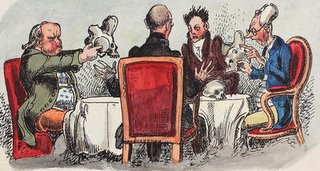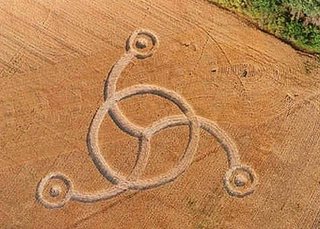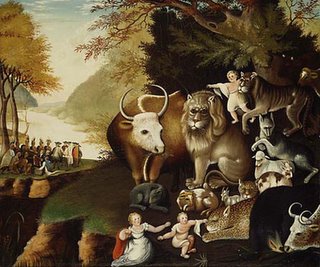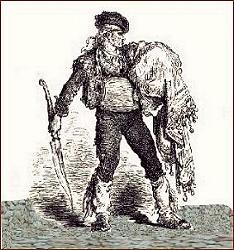 Why are you the person you are? Are you who you are from accidents of birth? What is it that makes you think this and that, act that way or not? If you'd been born a Muslim, would you really be the same person you are now or would you be the same body with a whole different mind working in it? What part and how much of you is experience and environment? How much and what is innately you? How much of that is open to influence, and by what or whom? What if you were born a neolithic creature and all that you are as a Modernist is merely poured in from outside? What if it had been some other stuff? What if it is as you read?
Why are you the person you are? Are you who you are from accidents of birth? What is it that makes you think this and that, act that way or not? If you'd been born a Muslim, would you really be the same person you are now or would you be the same body with a whole different mind working in it? What part and how much of you is experience and environment? How much and what is innately you? How much of that is open to influence, and by what or whom? What if you were born a neolithic creature and all that you are as a Modernist is merely poured in from outside? What if it had been some other stuff? What if it is as you read?
How independent are you in your mind? How independent are those around you? And how independent can you be even if it's terribly important to you to be so? How much do you depend on your family, your mates, your society, your culture, your history, your ethic group, your nation to define who you are and what you are?
We've looked at a number of thinkers here who have written that you are not you unless you are part of a group. Without the group to define the person, the individual is nothing, is inauthentic, not really Human at all. If you are part of a group, then you must have a place and a space in which to be at all, and to be part of a group and the group. You have to be somewhere. That somewhere is part of you identity, according to some. You become part of that someplace and it defines you as a being. If you are part of a group in a city, you are different from those in groups living in nature.
If you are alone in a city, you are barely Human, according to identity thinkers. You have no group, and worse, you have no contact with nature, nature being that which gives you meaning in a deep sense, spiritual meaning: alone in a city you are a machine-like creature going through Human-like motions without authenticity. It is contact with nature that gives you meaning as a real thing because you, as a body, are part of nature. And to be real even in a state of nature you must belong to a group in nature. What if you are all those things, and you also speak the same language others speak around you, and even if your family has lived in the same natural space with others for ages? You belong, right? But what if the natural place where you live is not your ancestral homeland? What if the spirit of nature that is the soil itself, expressed in the forests and the rivers and the sky above you, isn't really yours at all? What if you and yours came later and settled. What if, in a field of grass you and yours are weeds? What if you have different blood? And what if your blood mixes with that of those who are "authentic?"
Below we'll finish our look at Janet Biehl's fine essay on ecofascism. Her position seems to be that one must act in prudent ecological fashion, which reasonable people will agree with; but she goes on from there to suggest that one must also adapt to social conditions that determine ones being, and that the best way to do so is to create a good social situation in which to grow people rightly. There we must leave Ms. Biehl to herself. Until then, we follow happily.
Biehl addresses many of the questions we raised above. She does so from an environmental perspective. She looks again at the history of ecology, and she shows the rise of today's fascist ecology, some of which we might find appealing, and that others of our own, as it were, certainly do. What do we make of it?
Rather than allow ourselves to passively take on the attributes of our times and places, determined for us as unconscious actors consciously formed and guided by outside forces, us dependent on the whims and will of others, let's look at some of what shapes us so we can, if we choose, determine ourselves for ourselves, and even from there determine the nature of our own societies and history and the future of our world.
***

Social Darwinist 'Ecology': Herbert GruhlBahro, let it be said, claims to look for the roots of the ecological crisis in the "sickness" in "white Nordic humanity." But the far right most often locates these roots in non-Europeans and uses 'ecology' to marshal classic racist arguments against Third World immigration. In
the "Europe of fatherlands" of the "ethnopluralism" concept, each Volk requires its own specific, familiar home environment in order to thrive. Interference from outside -- including immigration -- disturbs that natural environment, the "natural ecology of the Volk." Most often, the far right claims to be defending cultures rather than races; if the Nazis persecuted those who practiced 'race mixing' and sought to preserve 'racial purity,' today's fascists say they oppose cultural mixing and seek to preserve their culture. Thus, the ecofascist and misleadingly named Ecological Democratic Party (�kologische Demokratische Partei, or �DP) calls for "asylum-seekers [to] be accepted by countries that belong to the same cultural area as the asylum seekers themselves," and they call for "
Heimat instead of multiculture." 98
The hollowness of such claims becomes evident, however, when they are clothed in terms of 'ecology.' For the far right's notion of ecology is in fact nothing more than social Darwinism, the reactionary ideology that biology dictates the form of society, that
genes rather than environment determine culture. Social Darwinist 'ecology' can then advance seemingly 'ecological' reasons for keeping out immigrants and for asserting ethnic or national identity -- while avoiding the terminology of race.
Social Darwinism has deep roots in the German ultra-right. When it first emerged as a doctrine in the nineteenth century, its German form was very different from its Anglo-American form. Like Anglo-American social Darwinism, German social Darwinism projected human social institutions onto the nonhuman world as 'natural laws,' then invoked those 'laws' to justify the human social arrangements as 'natural.' It also applied the maxim 'survival of the fittest' to society. But where Anglo-American social Darwinism conceived the 'fittest' as the individual entrepreneur in a 'bloody tooth and claw' capitalist jungle, German social Darwinism overwhelmingly conceived the 'fittest' in terms of race. Thus, the 'fittest' race not only would but should survive, vanquishing all its competitors in its 'struggle for existence.' As historian Daniel Gasman observes:
It may be said that if Darwinism in England was an extension of laissez faire individualism projected from the social world to the natural world, [in Germany it was]
a projection of German romanticism and philosophical idealism. . . . The form which social Darwinism took in Germany was
a pseudo-scientific religion of nature worship and nature-mysticism combined with notions of racism. 99
Since this social Darwinism seemed to give a 'scientific' basis to racism, National Socialism drew heavily on it to provide 'scientific' grounds for its virulent racism. Hitler wrote in Mein Kampf, for example, that people "owe their higher existence, not to the ideas of a few crazy ideologists, but to the knowledge and ruthless application of
Nature's stern and rigid laws." Among these 'laws': "Nature usually makes certain corrective decisions with regard to the racial purity of earthly creatures. She has little love for bastards." 100 To establish their totalitarian regime and implement genocide, the Nazis easily drew on the common ideology that
the Volk mediates between individual and cosmos, rendering the individual mainly a member of a larger whole, the 'Volk whole' or 'Volk community.'
It is well known among ecological activists today that
Ernst Haeckel coined the term ecology in the 1860s; what is less known is that Haeckel was the primary spokesperson for German social Darwinism in the latter half of the nineteenth century, as Gasman shows. German social Darwinism was thus almost immediately married to the concept of ecology.
Haeckel was also a believer in mystical racism and nationalism, so that German social Darwinism was from the beginning
a political concept that lent romantic racism and nationalism a pseudo-biological basis. In fact, as Gasman argues,
racially inspired social Darwinism in Germany . . . was almost completely indebted to Haeckel for its creation. . . . His ideas served to unite into a full-bodied ideology the trends of racism, imperialism, romanticism, anti-Semitism and nationalism. . . . It was Haeckel who brought the full weight of science down hard on the side of what were Volkism's essentially irrational and mystical ideas. 101
Haeckel himself was a proponent of carrying over concepts like 'selective breeding' and 'racial hygiene' from nonhuman nature into human society.
Despite the widely different scientific concepts of ecology that have emerged since Haeckel's day,
the 'ecology' that today's ecofascists draw upon is essentially the social Darwinism of Haeckel. Perhaps the most prominent social Darwinist-'ecological' racist in Germany today is Herbert Gruhl, 102 a former Christian Democrat parliamentarian whose best-selling 1975 book, A Planet Is Plundered: The Balance of Terror of Our Politics, makes an explicit social Darwinist interpretation of ecology. 103 In the late 1970s and early 1980s
Gruhl participated in the formation of the German Greens with a new political group he had founded, Green Action Future (GAZ). I
t was Gruhl who created the slogan "We are neither left nor right; we are in front," according to Charlene Spretnak and Fritjof Capra. 104 In the early 1980s, ultrarightists, including Gruhl's GAZ, struggled with leftists and centrists for the direction of the Green Party; the center-left ultimately took control. "It is to the credit of the leftist tendencies in the founding phases of the Greens," writes Ditfurth, "that the ultra-right and neofascists were prevented from taking over ecological politics, as they were threatening to do at the time." 105
Gruhl, on the losing end, concluded that the Greens had given up their "concern for ecology in favor of a leftist ideology of emancipation" and walked out of the party. He continued his fight for his conception of ecology outside the Greens, however; with his fellow ultra-rightist Baldur Springmann, he founded the Ecological Democratic Party (�DP) in 1982 and wrote most of its programmatic literature, orienting ecology toward fascism and endowing racism and population policy with an 'ecological' legitimation. In 1989, when an �DP party congress dared to pass a resolution formally distancing the party from the NPD and the Republicans, this 'leftist victory' was too much for Gruhl, and he left to form yet another group. Since the mid-1980s, Gruhl has appeared as a guest speaker at various neo-Nazi and Holocaust-denial events and continues to publish books on 'ecology.'
Gruhl's social Darwinist 'ecology' reduces human beings to their biological attributes and applies the 'laws' of nature to society: "All laws that apply to living nature generally apply to people as well, since people themselves are part of living nature," he maintains. 107 These 'natural laws' dictate that people should accept the present social order as it is. Domination, hierarchy, and exploitation should be accepted, since "the swan is white, without anyone artificially cleaning it. The raven is black, and everything is in its natural place of its own accord. This is good. All the strivings of people . . . for organized justice are simply hopeless." 108 People should adapt to existing conditions instead of making futile attempts to change them, since "every life-form accommodates itself to that which it cannot change." 109
If society were set up according to nature, Gruhl believes, cultures would institute prescriptions against those who deviate from their existing norms, since "in the hunting grounds of the wilderness, if an animal breaks the unwritten law of the herd and goes its own way, it generally pays for this independence with its life." 110 Moreover, cultures should be kept separate from one another: "When many cultures are all jumbled together in the same area, the result will be that they live alongside each other, in conflict with each other, or . . . they will undergo entropy, becoming a mixture whose value lessens with every intermixing, until in the last analysis it has no more worth." The reason for cultural separation too has its basis in 'natural law,' "a law of entropy which we particularly have in ecology, and this law also holds for human cultures." 111
In the coming years, Gruhl believes that cultures around the globe will compete for survival over the means of life, in a social Darwinist struggle for existence. "There is no doubt that the wars of the future will be fought over shares in the basic foundations of life -- that is, over the basis of nutrition and the increasingly precious fruits of the soil. Under these circumstances, future wars will far surpass in frightfulness all previous wars." 112 The peoples who have the best prospects for survival will be those who are best armed and who best conserve their resources; those who "succeed in bringing their military preparedness to the highest level, while keeping their standard of living low, will have an enormous advantage." 113
In the interests of this struggle, Germans must not only arm themselves but preserve their environment by keeping the number of people who inhabit it down: "Violations of ecological equilibrium and the destruction of natural living spaces [Lebens�ume] are directly related to population density."
"Overpopulation" in the Third World, however, has produced "armies of job-seekers" who are entering Germany with a "capacity for annihilation" comparable to a "nuclear bomb," Gruhl writes. This "tidal wave of humanity" is a primary menace that will cause "all order to break down" in Europe. Third World immigrants are thus threatening European culture itself, which will "perish not because of the degeneration of its own people, as previous high civilizations have, but because of physical laws: the constantly overflowing mass of humanity on an earth's surface that remains constant." 115 Therefore, there is no room for immigrants in the Federal Republic: "Because of its high population density, the Federal Republic of Germany, one of the most densely settled countries on earth, cannot be a destination country for immigrants. We therefore reject the unlimited acceptance of foreigners." 116 Accordingly, Gruhl demands "an end to immigration for ecological reasons." 117
The 'laws of nature,' for Gruhl, offer a solution to Third World immigration, especially the 'law' that "the only acceptable currency with which violations of natural law can be paid for is death. Death brings the equalization; it cuts back all life that has overgrown on this planet, so that the planet can once again come into equilibrium." 118 Fortunately, in his view, Third World people will accept this lethal solution since their lives "rest on a completely different basic outlook on life from our own: their own death, like that of their children, is accepted as fate." 119
Needless to say, Gruhl does not think democracy is the most efficient way to address these problems. After all, this situation "will take on the proportions of an emergency in coming years, and attempts that will be made to prevail in it will produce a permanent state of emergency." 120 In an interview with the editors of Junge Freiheit (Young Freedom), the flagship publication of the National Revolutionaries, Gruhl was asked whether the problems of protecting the environment and life can be solved within a democracy. "Probably not," he replied, "because democracies follow the Zeitgeist, and in all countries of the world today the Zeitgeist is to raise the standard of living further. Parties that warn about this and advocate renunciation of consumption seem to have little chance." Instead, Gruhl demands a "strong state," strong both internationally and domestically -- if possible, even a state with "dictatorial powers." 121
In the autumn of 1991, the environmental minister of Lower Saxony shocked many observers by awarding Herbert Gruhl a highly prestigious state honor. "With his international best-seller A Planet Is Plundered," minister Monika Greifahn said, Gruhl has "placed ideas of environmental protection and care at the forefront of public political consciousness." 122
A Social Ecology of Freedom
" A combination of nationalism, authoritarianism, and yearnings for charismatic leaders that is legitimated by a mystical and biologistic 'ecology' is potentially socially catastrophic. Just as the v�lkisch movement ultimately was channeled into the Nazi movement, so too
new social movements that appeal to these concepts must be mindful of their potential for political and social catastrophe if they are channeled into a dangerous political direction that draws on mysticism.
" A love of the natural world and
alienation from modern society are in themselves
innocent and legitimate ideas, and it was by no means a historical necessity that they be permutated into a justification for mass murder. Nor is 'ecology' limited to an interpretation as a social Darwinist racial jungle, or politicized along tribal, regional, and nationalist lines. Nor is 'ecology' inherently an antirational, mystical concept. Finally, the ecological crisis can hardly be dismissed; it is itself very real and is worsening rapidly. Indeed, the politicization of ecology is not only desirable but necessary.
" Although this article has focused on the 'ecological' right in the Federal Republic, 'ecological' fascism is hardly limited to that country. In Britain, a wing of the National Front issues the cry, "Racial preservation is Green!" In the United States, the notorious white supremacist Tom Metzger remarks:
I've noticed that there's an increased number of young people in the white racialist movement who are also quite interested in ecology, protecting the animals from cruelty and things like that, and it seems to me that as we are becoming more aware of our precarious state, the white man, the white woman's, state in the world, being only about 10 percent of the population, we begin to sympathize, empathize more, with the wolves and other animals." 123
" His colleague Monique Wolfing agrees: "Well, naturally. They're in the same position we are. Why would we want something created for ourselves and yet watch nature be destroyed? We work hand in hand with nature and
we should save nature along with trying to save our race." 124 The noted U.S. deep ecologist Bill Devall, who is certainly not a fascist, has allowed anti-immigration themes to enter his views: He notes with apparent relief that while "population is beginning to stabilize in Western Europe and North America," there is a caveat -- "in-migration." Devall chastises those who would "justify large-scale in-migration to Western Europe and North America from Latin America and Africa" as guilty of "misplaced humanism." 125
" What is clearly crucial is how an ecological politics is conceived. If the Green slogan "we are neither left nor right but up front" was ever meaningful, the emergence of an 'ecological right' defines the slogan's bankruptcy conclusively. The need for an ecological left is urgent, especially one that is firmly committed to a clear, coherent set of anticapitalist, democratic, antihierarchical views. It must have firm roots in the internationalism of the left and the rational, humanistic, and genuinely egalitarian critique of social oppression that was part of the Enlightenment, particularly its revolutionary libertarian offshoot.
" But an ecologically oriented politics must deal with biological phenomena warily, since interpretations of them can serve sinister ends. When 'respect for Nature' comes to mean 'reverence,' it can mutate ecological politics into a religion that 'Green Adolfs' can effectively use for authoritarian ends. When 'Nature,' in turn, becomes a metaphor legitimating sociobiology's 'morality of the gene,' the glories of 'racial purity,' 'love of Heimat,' 'woman equals nature,' or 'Pleistocene consciousness,' the cultural setting is created for reaction. 'Ecological' fascism is a cynical but potentially politically effective attempt to mystically link genuine concern for present-day environmental problems with time-honored fears of the 'outsider' or the 'new,' indeed the best elements of the Enlightenment, through ecological verbiage. Authoritarian mystifications need not be the fate of today's ecology movement, as social ecology demonstrates. But they could become its fate if ecomystics, ecoprimitivists, misanthropes, and antirationalists have their way."
http://www.spunk.org/library/places/germany/sp001630/janet.html***
Who fits in our world and who doesn't, and how do we decide? What do we do with a billion Muslims at war with the West, and that same billion dependent on our Modernity for their very lives thanks to their garbage cultures that won't allow them to be self-suffcient at least but propell them into suicidal rages against us? what do we do with those people? And what do we do with those among us already, those who are us as much as we are? How do we measure the properties of belonging? Who fits, and who's a weed?
***
Note on the graphic:A coloured cartoon from the first issue of the Glasgow Looking Glass, 11 June 1825, entitled "Numpskulls and Bumpskulls". The cartoonist is poking fun at members of the Scientific Society and their fashionable interest in phrenology.
Phrenology was the "science" of character divination, and its adherents believed that the shape of a skull and the bumps and uneven areas upon it revealed much about the character and "nature" of the individual. The "bumpskulls" in the cartoon are the objects of study; the "numpskulls" are the men of science who are doing the studying!
Reference: Sp Coll Bh14-x.8
Glasgow University Library, Special Collections
"Numpskulls and Bumpskulls". The cartoonist is poking fun at members of the Scientific Society and their fashionable interest in phrenology.
Phrenology was the "science" of character divination, and its adherents believed that the shape of a skull and the bumps and uneven areas upon it revealed much about the character and "nature" of the individual. The "bumpskulls" in the cartoon are the objects of study; the "numpskulls" are the men of science who are doing the studying!
Reference: Sp Coll Bh14-x.8
Glasgow University Library, Special Collections
http://images.google.ca/imgres?imgurl=http://www.theglasgowstory.com/images/TGSB00114_m.jpg&imgrefurl=http://www.theglasgowstory.com/image.php%3Finum%3DTGSB00114&h=214&w=400&sz=40&tbnid=tMkJIimLNbwJ:&tbnh=64&tbnw=120&hl=en&start=355&prev=/images%3Fq%3Dphrenology%26start%3D340%26svnum%3D10%26hl%3Den%26lr%3D%26safe%3Doff%26client%3Dfirefox-a%26rls%3Dorg.mozilla:en-US:official_s%26sa%3DN
 A war broke out 5,000 years ago in the Fertile Cresent, Nomads against the Settled. That war continues today in our cities, in the West, across the Earth wherever Men live in struggle against the forces of Nature rather helpless than in its clutches.
A war broke out 5,000 years ago in the Fertile Cresent, Nomads against the Settled. That war continues today in our cities, in the West, across the Earth wherever Men live in struggle against the forces of Nature rather helpless than in its clutches. The West is divided against itself, one side favoring Abel, the other Cain. How do we live rightly? What is the Good?
The West is divided against itself, one side favoring Abel, the other Cain. How do we live rightly? What is the Good? ***
***









